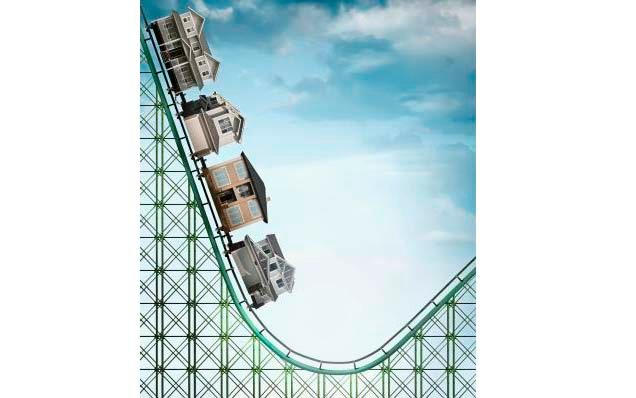
Climbing, dipping, climbing and dipping again — Dubai’s housing market has rarely known a moment of steady growth since the emirate began to transform itself into a hub for business and tourism. Prices had been gaining at the fastest pace in the world before a 2008 collapse caused values to drop as much as 65 per cent. The rebound after that turned into another spike after home values surged 56 per cent through 2013. The rising values prompted the UAE Central Bank to take steps early last year to curb mortgage lending and Dubai’s government doubled the transaction tax in a bid to temper price increases.
Residential transactions registered with Dubai Land Department (DLD) in the first half of this year declined 45 per cent in value and 47 per cent in number compared with the same period in 2014. The real estate information company Reidin’s sales index dropped 8 per cent year-on-year in June.
Khawar Khan, Research Manager, at real estate broker Knight Frank, explains that with prices already around 25 per cent lower compared to their 2008-09 peak, the scope for further falls is limited.
“We don’t think Dubai residential prices will experience the same hard landing as they did in 2008-09. Dubai’s real estate sector today is also more mature from a legislative point of view, with authorities and developers having introduced various measures over the past couple of years in order to curb speculative behaviour. As a result, flipping today is less common compared to pre-2008,” he says.
Robin Williamson, Managing Director for Real Estate and Industry Leader, Deloitte Middle East, agrees. “While certain areas of Dubai’s residential real estate market are experiencing a softening in performance and growth, what we are actually seeing is, to certain extent, a maturing of the market and one that is influenced more by external factors.”
Dubai’s real estate market has hardly seen a dull moment since the emirate first opened its doors to foreign ownership in early 2000s. The housing market seems to be coming full circle this year, as prices even out and demand drops. While analysts agree that corrective measures such as the mortgage cap and increase in property registration fees and moves by developers to restrict reselling until handover, have impacted speculation, they believe availability has been the major reason for the dampening residential activity.
“Deloitte estimates a further 105,000 residential units will come to the market between 2015 and 2020, representing an additional 28 per cent of total stock. That buyers today have a greater choice means that developers have to be more competitive and price conscious,” says Williamson.
Looking ahead, Erik Volkers, Senior Consultant, Research & Consultancy, CBRE Middle East, expects the residential market to “remain subdued over the course of 2015”.
“Dubai could potentially face another price correction before 2020, due to the volume of potential supply that is expected to be delivered in areas like Dubai Creek Harbour, Meydan, Mohammed Bin Rashid City, Deira Islands, Dubai Waterfront/Palm Jebel Ali, which have yet to see significant construction activity,” he says.
If the foreign property ownership law was the catalyst that kindled Dubai’s real estate boom in 2006, it was the abundance of foreign money that drove the boom to unprecedented heights. And this seems to hold true even today. “Given that the majority of real estate investors come from outside the UAE, their foreign currencies and economies are definitely impacting future growth in the UAE,” says Volkers.
The key question for investors now is whether Dubai has a sustainable USP, and if Expo 2020 will prove to be another major catalyst for real estate growth in the
city. “Dubai remains one of the safest locations in the world, with excellent connectivity, strong economic prospects, a low tax regime and a stable political system — combined, these factors will undoubtedly play an important role in paving the way for the emirate’s further success as a hub,” says Khan.
Volkers believes the emirate is on the right track to future success. “By 2020, the city’s infrastructure would have soared to the next level. The new theme park facilities will form the backbone of Dubai’s tourism strategy moving forward, as the city looks to add new depth to its leisure offering, in order to appeal to a new demographic of visitors and ultimately increase the average length of stay in the country.”
While Williamson agrees that winning Expo 2020 was a major plus, he believes, “as with other major global events, there will be particular focus on the legacy this development will leave, and time will determine what level of benefit this will give to its property sector.











